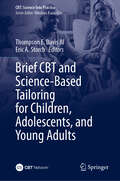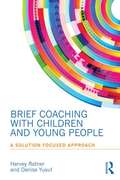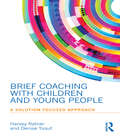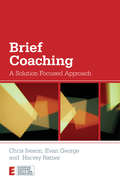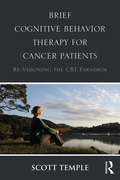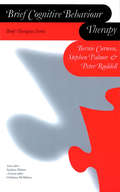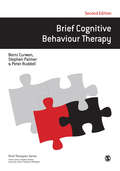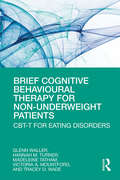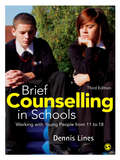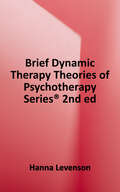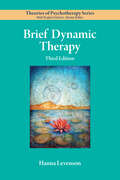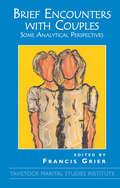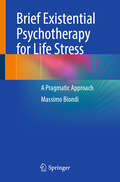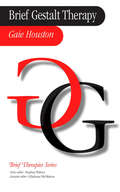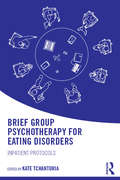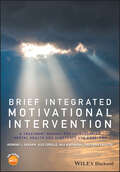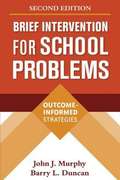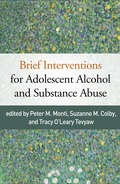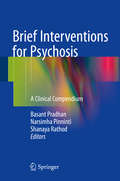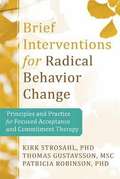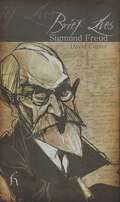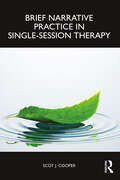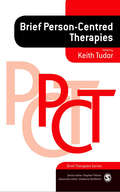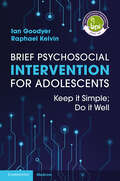- Table View
- List View
Brief CBT and Science-Based Tailoring for Children, Adolescents, and Young Adults (CBT: Science Into Practice)
by Eric A. Storch Thompson E. DavisThis book highlights the ongoing trend of brief treatments in psychotherapy for child and adolescent populations. Whereas their therapeutic predecessors may have taken 15 to 20 one-hour sessions or more, these newer therapies may begin to alleviate symptoms in only weeks, days, or even hours on the same day. Interest in child and adolescent brief and intensive therapies is currently at an all-time high on the heels of research showing impressive results for these interventions. Treatments such as One-Session Treatment for specific phobias which occurs in only one, three-hour session or Intensive Cognitive-Behavioral Therapy with Exposure and Response Prevention for obsessive-compulsive disorder which occurs 3-5 times weekly in 1-3-hour sessions over several weeks, are prominent examples. This volume builds on this growing interest and the emerging child and adolescent research, summarizing the efficacy of these interventions. Further, this volume will include key introductory chapters on the emergence of brief and intensive therapies, the ethics of their use, their cost-effectiveness, and the current state of the science. Brief therapies for specific disorders and via specific methodologies comprise separate chapters. Each chapter incorporates an exemplar case study (including a case overview, formulation/conceptualization, treatment description, follow-up, and recommendations for refractory cases). Also included are multicultural insights and ethical considerations. Furthermore guidance is provided on how to use the current and ongoing evidence base to inform formulation and treatment. This volume is timely and thorough in its presentation of the relevant literature and provides a much-needed resource for students, practitioners, and researchers alike. In a moment where youth mental health problems are on the rise, this is the book we need! Tara Peris, Ph.D. UCLA Like Superman squeezing coal into diamonds, Davis and Storch have compiled the definitive guide to brief, concentrated psychotherapy. Eli Lebowitz, Ph.D. Yale Child Study Center Davis and Storch score big in this edited volume on Brief, Intensive, and Concentrated treatments for a host of childhood problems. Thomas Ollendick, Ph.D. Virginia Tech
Brief Coaching with Children and Young People: A Solution Focused Approach
by Harvey Ratner Denise YusufBrief Coaching with Children and Young People: A Solution Focused approach is the first book of its type to describe the thinking and practice of Solution Focused coaching with these age groups. Ratner and Yusuf have created a practical, jargon-free resource for all those who work with and support children, young people and their families. It will be invaluable for coaches, therapists and counsellors as well as anyone who interacts with children and young people, including social workers, teachers and mentors and foster parents.
Brief Coaching with Children and Young People: A Solution Focused Approach
by Harvey Ratner Denise YusufBrief Coaching with Children and Young People: A Solution Focused approach is the first book of its type to describe the thinking and practice of Solution Focused coaching with these age groups. The approach empowers young people to find their own solutions in the shortest possible time, focusing on where they want to get to rather than the details of the problem they are concerned about. The authors’ emphasis on practical and straightforward techniques and materials will equip all those interested in working with and supporting young people and their families to help them achieve their hopes for the future. The book is illustrated with numerous examples from the coaching practice of the authors in different settings, with a particular emphasis on challenging cases. As a whole, it serves as a key resource for working with children and young people, but each chapter can also be read individually to enhance the reader’s understanding of the topic. Downloadable resources are available online which enhance the practicality of the text. Ratner and Yusuf have created a practical, jargon-free resource for all those who work with and support children, young people and their families. It will be invaluable for coaches, therapists and counsellors as well as anyone who interacts with children and young people, including social workers, teachers and mentors and foster parents.
Brief Coaching: A Solution Focused Approach (Essential Coaching Skills and Knowledge)
by Evan George Harvey Ratner Chris IvesonBrief Coaching offers a new approach to coaching by considering how the client will know when they have reached their goal, and what they are already doing to get there. The coach aims to work towards the solution rather than working away from the problem, so that the client's problem is not central to the session, but instead the coach and the client work towards the client's preferred future. This book employs case examples and transcripts of sessions to offer guidance on: looking for resources rather than deficits exploring possible and preferred futures examining what is already contributing to that future treating clients as experts in all aspects of their lives. This practical guide includes summaries and activities for the coach to do with the client and will therefore be a useful tool for both new and experienced coaches, as well as therapists branching into coaching who want to add to their existing skills.
Brief Cognitive Behavior Therapy for Cancer Patients: Re-Visioning the CBT Paradigm
by Scott TempleBrief Cognitive Behavior Therapy for Cancer Patients is a practical, clinical guide that allows for the integration of techniques from multiple newer CBT models, organized around a clear conceptual foundation and case conceptualization. The book targets those cognitive, emotional, and behavioral processes that research suggests are instrumental in the maintenance of human psychological suffering. Author Scott Temple also draws on newer models that build on strengths and resilience and brings clinical work to life through vivid case examples, worksheets, and case conceptualization forms. Detailed vignettes show clinicians how to create a case conceptualization as a guide to treatment, as well as how to integrate Beckian and newer CBT techniques.
Brief Cognitive Behaviour Therapy (Brief Therapies series)
by Stephen Palmer Berni Curwen Peter Ruddell`[This] will be a useful resource for anyone who is interested in learning more about Cognitive Behaviour Therapy' - Behavioural & Cognitive Psychotherapy This practical guide, based on the theory that emotional disorders are influenced by negatively biased thinking, describes how brief cognitive behaviour therapy can provide effective help to clients suffering from a wide range of disorders, including anxiety, depression, obsessive-compulsive disorder and post-traumatic stress, or those who are suicidal. Using illustrative case material throughout, the authors outline strategies for helping clients examine and overcome unhelpful beliefs and patterns of thought at the root of their distress. Following an explanation of brief therapy and the theory behind cognitive-behaviour therapy, they describe the process of working with clients through all stages of counselling.
Brief Cognitive Behaviour Therapy (Brief Therapies series)
by Berni Curwen Professor Stephen Palmer Peter RuddellThis timely new edition describes how to use cognitive behaviour therapy successfully with clients in a brief, time-limited way. After reading this book therapists will be able to provide effective help to clients suffering from a wide range of disorders, including anxiety, depression, obsessive-compulsive disorder and post-traumatic stress, or those who are suicidal. Following an explanation of brief therapy and the theory behind cognitive behaviour therapy, the authors outline strategies for helping clients overcome unhelpful beliefs and thought patterns through all stages of counselling. Using illustrative case material throughout, the updated book includes: extra practical material for the client and therapist to use during the counselling process a brand new chapter on brief CBT in groupwork expansion of discussion on counselling suicidal clients within a brief CBT framework. Every trainee psychotherapist should own a copy of this book, and it is important reading for all new health professionals working in the NHS and private practice.
Brief Cognitive Behaviour Therapy (Brief Therapies series)
by Stephen Palmer Berni Curwen Peter RuddellThis timely new edition describes how to use cognitive behaviour therapy successfully with clients in a brief, time-limited way. After reading this book therapists will be able to provide effective help to clients suffering from a wide range of disorders, including anxiety, depression, obsessive-compulsive disorder and post-traumatic stress, or those who are suicidal. Following an explanation of brief therapy and the theory behind cognitive behaviour therapy, the authors outline strategies for helping clients overcome unhelpful beliefs and thought patterns through all stages of counselling. Using illustrative case material throughout, the updated book includes: extra practical material for the client and therapist to use during the counselling process a brand new chapter on brief CBT in groupwork expansion of discussion on counselling suicidal clients within a brief CBT framework. Every trainee psychotherapist should own a copy of this book, and it is important reading for all new health professionals working in the NHS and private practice.
Brief Cognitive Behavioural Therapy for Non-Underweight Patients: CBT-T for Eating Disorders
by Victoria Mountford Tracey Wade Hannah Turner Madeleine Tatham Glen WallerMost people with eating disorders struggle to find an effective therapy that they can access quickly. Brief Cognitive Behavioural Therapy for Non-Underweight Patients: CBT-T for Eating Disorders presents a new form of cognitive behavioural therapy (CBT) that is brief and effective, allowing more patients to get the help that they need. CBT is a strongly supported therapy for all adults and many adolescents with eating disorders. This 10-session approach to CBT (CBT-T) is suitable for all eating disorder patients who are not severely underweight, helping adults and young adults to overcome their eating disorder. Using CBT-T with patients will allow clinicians to treat people in less time, shorten waiting lists, and see patients more quickly when they need help. It is a flexible protocol, which fits to the patient rather than making the patient fit to the therapy. Brief Cognitive Behavioural Therapy for Non-Underweight Patients provides an evidence-based protocol that can be delivered by junior or senior clinicians, helping patients to recover and go on to live a healthy life. This book will appeal to clinical psychologists, psychiatrists, psychotherapists, dietitians, nurses, and other professionals working with eating disorders.
Brief Counselling in Schools: Working with Young People from 11 to 18
by Mr Dennis LinesBrief Counselling in Schools, third edition, is a highly practical and accessible guide to helping and supporting young people experiencing difficulties both at home and at school or college. Covering issues from low self-esteem and sexuality, to substance misuse and aggression, the author draws on a method of brief integrative counselling to illustrate how a time-limited therapy can work effectively in an often pressured and time-limited setting. This fully revised and updated edition: " includes a whole new chapter on self-harm " discusses the latest research findings " outlines up-to-date Safeguarding legislation and Child Protection protocols " explores a teamwork approach to counselling " examines the contribution of neuroscience to adolescent brain development " considers the harmful effects of cyber bullying " is in an accessible format with reflective exercises on ethical issues. Steeped in vivid case examples, therapeutic dialogue and points for reflection, this invaluable book will help develop the theoretical knowledge, understanding and skills base of any youth counsellor, teacher or social worker based in a school or college setting.
Brief Dynamic Therapy
by Hanna LevensonThe author provides an overview of brief dynamic therapy, a time-efficient treatment in which the therapist maintains a focus on specific client goals within a psychodynamic conceptual framework. Common characteristics of these approaches include time management, defined focus, circumscribed goals, active therapist participation, rapid assessment, prompt intervention, an awareness of unconscious processes, and techniques that quickly foster a strong alliance with the client. This concise volume focuses largely on one popular model in particular: time-limited dynamic psychotherapy (TLDP). TLDP is an integrative approach that uses techniques from attachment theory, interpersonal neurobiology, affective-experiential learning, and systems orientations to help clients with long-standing, dysfunctional ways of relating to others. The author explores this integrative, culturally sensitive approach, its theory, history, the therapy process, primary change mechanisms, empirical basis, and future developments. This revised edition includes updated case examples, as well as a wealth of new research findings -- including process-outcome studies -- that affirm treatment effectiveness, explain how alliance ruptures are repaired, and new research on the "reconsolidation process" that demonstrates how sudden, dramatic change happens in brief dynamic therapy.
Brief Dynamic Therapy (Theories of Psychotherapy Series®)
by Hanna LevensonA comprehensively revised edition of this essential guide to brief dynamic therapy, an integrative, culturally-sensitive, time-efficient model of psychotherapy. In this third edition, Hannah Levenson provides the history and theoretical basis of time-limited dynamic psychotherapy (TLDP). In the years since the earlier editions, new research findings, including process-outcome studies, have affirmed the effectiveness of this treatment, while also detailing the process by which alliance ruptures are repaired in TLDP. New clinical research also helps illuminate the &“reconsolidation process" in which sudden, dramatic change happens in brief dynamic therapy. TLDP is an integrative approach that uses techniques from attachment theory, interpersonal neurobiology, affective-experiential learning, and systems orientations to help clients with long-standing, dysfunctional ways of relating to others. The author explores this integrative, culturally-sensitive approach, its theory, history, the therapy process, primary change mechanisms, empirical basis, and future developments.
Brief Encounters with Couples
by Francis GrierDeriving from a conference organised by the Tavistock Marital Studies Institute, the present volume draws the main focus of its inquiry from a few fundamental questions. In its various brief encounters, and in disparate contexts, how effective can a psychoanalytic approach be when it addresses the parental/child or adult couple relationship? What specific quality of contact can be achieved in the relationship between client(s) and therapist in shorter-term work? This compilation of essays, written by experienced practitioners, engages directly and positively these, and other questions, demonstrating with clinical material the efficacious contribution of a psychoanalytic psychotherapy. In both the similarity and variety of responses to the complex issues explored the authors display a creative engagement and theoretical understanding that will be of great interest and stimulus to all professionals working in this field.
Brief Existential Psychotherapy for Life Stress: A Pragmatic Approach
by Massimo BiondiThe book presents a detailed description of brief existential psychotherapy (BEP) based on an articulated model, integrating knowledge from existential psychotherapy, psychobiology of human stress, mind-body techniques, and principles of positive psychiatry and psychology. BEP is conducted according to a pragmatic method, centered on the view of one's existence, analysis, and response to critical life stress events, designing a route of acceptance and search for meaning in life. BEP does not substitute other psychotherapies or their indications. It is born for the short-term treatment of crises after severe life stress events, such as deaths of loved ones, losses, divorce, retirement, personal or collective emotional traumas, major violations of law, and detention in jail, with a particular emphasis on severe somatic diseases (cancer, myocardial infarction, stroke, degenerative diseases, and other subacute or chronic conditions that change life’s perspective). The volume presents a methodology of BEP based on traditional clinical psychopathology, with a first step of medical and psychopathological assessment, establishing a categorical and a dimensional diagnosis. Then, subsequent steps are provided in a brief psychotherapy course, with a more common format of 12-20 sessions, 1hr duration. The issues and aims of treatment are transversal across different psychiatric diagnoses, meaning the intervention follows similar activity lines, independently from the specific categorical diagnosis. The intervention is dedicated to people with existential suffering, without psychopathological diagnosis, too. Medical therapy and psychopharmacological treatment are given according to patient needs; there is no preclusion toward the integration between psychotherapy and psychopharmacotherapy, as well as other techniques with evidence of efficacy. Moreover, in some cases, appropriate psychopharmacotherapy consents to psychotherapy, impossible otherwise. This volume will be an invaluable tool for psychotherapists, psychologists, psychiatrists, counselors, social workers, and other medical professionals.
Brief Gestalt Therapy (Brief Therapies series)
by Gaie Houston`Anybody with the slightest interest in brief therapy should read this book. Now that the initial controversy over brief therapy has begun to subside it is great to see how brief therapy works in practice. Gaie Houston′s book is part of a series published by SAGE which sets out to do this - and hers is particularly illuminating and accessible. As she points out Gestalt is better equipped than many mainstream therapies to be applied to situations with extreme time constraints because it is both flexible and it acknowledges the part that can be played by other therapies. But what propels Houston′s book out of the hum drum - or indeed the defensive (or offensive) diatribes about short therapy which have appeared over the past few years - is her vivid accounts of real-life sessions, both one to one and group, which punctuate the text′ - Amazon Review Brief Gestalt Therapy demonstrates how the Gestalt approach can be used effectively in brief interventions with clients. Gestalt′s distinctively integrative nature and emphasis on a highly co-operative working alliance, make it particularly suited to brief work. The book sets out the basic theory and principles of Gestalt and looks at each phase of the therapeutic process from initial assessment through the beginning and middle stages to the ending of the work. It presents clear, practical strategies for therapists to follow and in particular examines: } aspects of Gestalt which are especially relevant to brief work -} the elements of successful therapy -} ways of improving skills. Brief Gestalt Therapy includes vignettes and detailed case studies which bring the theory alive. It will contribute much to both existing literature on Gestalt therapy and also brief therapy, and will be invaluable to trainee and practising Gestalt therapists.
Brief Group Psychotherapy for Eating Disorders: Inpatient protocols
by Kate TchanturiaIn the treatment of Anorexia Nervosa, delivering psychological interventions in a group format can bring unique benefits in addition to those associated with working with patients individually. These include: sharing experiences and learning from others in a safe and therapeutic environment, becoming accustomed to being with other people and practising interpersonal skills. However, these aspects of group treatment also represent a challenge for group facilitators as it is exactly these interpersonal and relational demands that patients find difficult to tolerate. Facilitators are likely to be confronted with low motivation, or complete disengagement, as a result of the discomfort evoked by spending time in psychological groups. Nonetheless, once these difficulties are successfully overcome, the group setting can be effectively utilised to address the specific aims of a given psychological intervention, as well as tapping into these wider benefits Drawing upon research carried out by the Maudsley national inpatient eating disorders programme, Brief Group Psychotherapy for Eating Disorders brings together expert contributions in order to review the evidence base, as well as discussing how the challenges of the group setting can be overcome. This book outlines newly-developed protocols for group interventions aimed at providing brief but effective treatment for an increased numbers of patients, and addresses the need to develop and evaluate cost effective psychological interventions for patients with Anorexia Nervosa. Brief Group Psychotherapy for Eating Disorders is designed to offer therapists, clinicians, and researchers in the field a synopsis of the available evidence along with guidance on how to put theory into practice effectively. It will also be an invaluable resource for students, trainees and teachers in the clinical, counselling, psychology, psychiatry, nursing, occupational therapy and other allied professions.
Brief Integrated Motivational Intervention: A Treatment Manual for Co-occuring Mental Health and Substance Use Problems
by Alex Copello Emma Griffith Hermine L. Graham Max J. BirchwoodBrief Integrated Motivational Intervention provides clinicians and specialist practitioners with a brief, evidence-based treatment approach for motivating clients, who have comorbid mental health and alcohol and drug misuse. Combines CBT, motivational interviewing, and the authors' own cognitive- behavioural integrated treatment (C-BIT) to engage clients in meaningful dialogue for change Utilizes the short 'window of opportunity' when clients are admitted to psychiatric hospital or have recently relapsed, and helps clinicians to maximize the potential of this 'teachable moment' Helpful tools such as session-specific content, illustrative case material and easy-to-use worksheets facilitate implementation of the approach across a range of settings including inpatient, community, and residential Developed by an expert team with many years of experience in both research and practice in the fields of psychosis and addiction
Brief Intervention for School Problems, Second Edition
by John Murphy Barry DuncanEvery interaction with a young person who is struggling is an opportunity for change. This highly practical guide helps school practitioners find effective solutions to academic and behavioral problems through brief counseling. It shows how to build on the ideas and resources that students, parents, and teachers bring to the intervention process, within an innovative, research-supported, time-limited framework. Extensive case material illustrates the authors' creative approach to building solutions and "busting problems" by putting clients in the driver's seat. Filled with real-world examples from both elementary and secondary settings, the book presents creative strategies for addressing disciplinary problems, poor academic performance, anxiety, compulsive behaviors, and other common difficulties.
Brief Interventions for Adolescent Alcohol and Substance Abuse
by Peter M. Monti Suzanne M. Colby Tracy O'Leary TevyawBringing together leading experts, this book demonstrates the unique value of brief motivational interventions for addressing adolescent alcohol and other substance use in a range of clinical contexts. It presents cutting-edge knowledge on the etiology and developmental context of adolescent addictive behaviors and reviews exemplary treatment approaches. Effective strategies are described for intervening with diverse populations, such as college students, youth in the justice system and in foster care, those with co-occurring substance abuse and psychiatric problems, LGBT youth, and Latino and American Indian adolescents. This book replaces the editors' influential earlier work, Adolescents, Alcohol, and Substance Abuse, with an expanded focus on practical applications. Most of the chapters are completely new.
Brief Interventions for Psychosis: A Clinical Compendium
by Narsimha Pinninti Shanaya Rathod Basant PradhanThis book offers a clinical guide that brings together a broad range of brief interventions and their applications in treating psychosis. It describes two core approaches that can narrow the current, substantial gap between the need for psychotherapeutic interventions for all individuals suffering from psychosis, and the limited mental health resources available. The first approach involves utilizing the standard therapeutic modalities in the context of routine clinical interactions after adapting them into brief and effective formats. To that end, the book brings in experts on various psychotherapeutic modalities, who discuss how their particular modality could be adapted to more effectively fit into the existing system of care delivery. The second approach, addressed in detail, is to extend the availability of these brief interventions by utilizing the circle of providers as well as the social circle of the clients so that these interventions can be provided in a coordinated and complementary manner by psychiatrists, psychologists, clinical social workers, case managers, peer support specialists and other providers on the one hand, and by family members, friends, social and religious institutions on the other.
Brief Interventions for Radical Change: Principles and Practice of Focused Acceptance and Commitment Therapy
by Kirk Strosahl Thomas Gustavsson Patricia RobinsonIn this book, you'll find a ready-to-use collection of brief assessment and case-formulation tools, as well as many brief intervention strategies based in focused acceptance and commitment therapy (ACT).
Brief Lives: Sigmund Freud (Brief Lives)
by David CarterBorn to Jewish parents in mid-19th-century Austria, Sigmund Freud is a controversial figure needing no introduction, yet his reputation owes as much to myth as to the facts of his life and his work. Here, David Carter uncovers the man buried beneath the mythology, tracing the life of this inimitable figure from his origins as the gifted first born of eight children, through his stellar academic career and his relationships and rifts with famous figures such as Josef Breuer. Also explored is why, despite his groundbreaking work on psychoanalytic theories—including the functioning of the subconscious, the repression of trauma, and the psychological import of dreams—Freud has frequently been the subject of derision and ridicule.
Brief Narrative Practice in Single-Session Therapy
by Scot J. CooperBrief Narrative Practice in Single-Session Therapy emphasizes collaboration, meaning making, and relational ethics in single-session conversations. Chapters provide a thorough orientation to the therapy and address the diverse circumstances clinicians face in these conversations.Separating from many long-held traditions in therapy, this book explores a guiding framework and the accompanying micro-skills that therapeutic conversations demand. In these pages, readers will learn how to recalibrate their listening habits and talk differently about problems in ways that help them quickly hear and generate possibilities. All those who provide psychotherapy, counselling, and coaching in time-constrained contexts will find this book useful and engaging, including those working in crisis and call-in settings, walk-in clinics, medical centres, and live-in contexts where change conversations are brief.
Brief Person-Centred Therapies (Brief Therapies series)
by Mr Keith Tudor`This is a book that the person-centered psychotherapy community has been waiting for ... this book opens a creative space in which the ongoing conversation about therapeutic efficacy in times of shrinking resources can be successfully engaged' - Professor Maureen O'Hara, Chair, Department of Psychology, National University, La Jolla, California `A wide-ranging and scholarly book which shows that person-centred therapy is fully alive to the challenges of the twenty-first century and is breaking new ground both clinically and theoretically' - Professor Brian Thorne, Emeritus Professor of Counselling, University of East Anglia "Likely to be of interest to anyone involved in counselling" - Times Higher Educaton Magazine, May 2009 Can the person-centred approach work in time-limited psychotherapy and counselling? This is a question that many practitioners grapple with as demand for brief therapy increases - particularly in the public sector. Brief Person-Centred Therapies is the first book to tackle the subject, bringing together the experience and insights of a leading international team of person-centred therapists. The book examines the philosophical and theoretical 'fit' between the person-centred approach and brief therapy. It also explores the issues which arise when working briefly in a range of different settings, including primary care, higher education, business, and prison, with couples and groups. Brief Person-Centred Therapies is essential reading for all person-centred trainees and for practitioners who want to work in services where brief or time-limited work is required or favoured. Keith Tudor is a UKCP registered psychotherapist, and has a private/independent practice in Sheffield offering therapy, supervision and consultancy.
Brief Psychosocial Intervention for Adolescents: Keep it Simple; Do it Well
by Ian Goodyer Raphael KelvinThe highest incidence for clinical depressions is during adolescence. Furthermore, mental health illnesses that recur over the life-course begin in young people. 70% of all mental health emerge before thirty years of age. Almost all interventions for young people have been first developed for and targeted at adults. Here for the first time is a talking therapy (BPI), that has been developed for, and with, adolescents. After thirty years of clinical experience with mentally ill adolescents and two major randomised controlled trials of treatment, the authors reveal a brief psychosocial intervention that is as effective as CBT for adolescents with depression with and without comorbid anxiety and conduct disorder. BPI can be taught to mental health practitioners in sixteen hours and they can immediately start delivery of care. After a six-month supervision, new BPI practitioners offer an evidence based and NICE approved treatment in their usual clinical practice.
